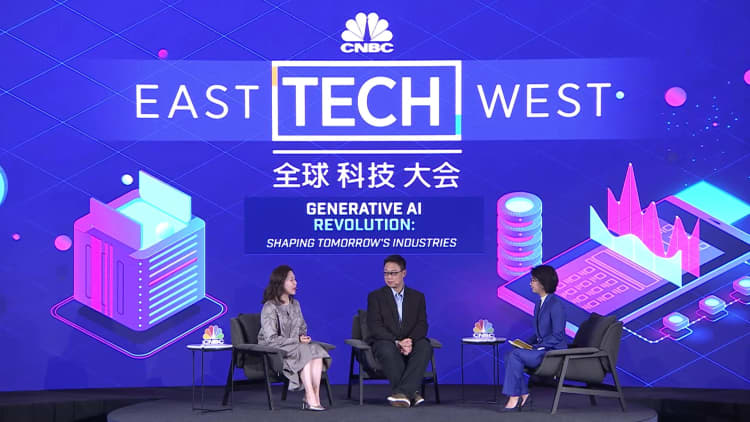ole_knx | iStock | Getty Images
The rate of AI adoption in businesses has yet to match the hype surrounding the technology, with data privacy, regulation and IT infrastructure representing major barriers to its widespread use, according to a recent study.
The global survey conducted by MIT Technology Review Insights and Australia-based telecommunications company Telstra, which included more than 300 business leaders, revealed that only 9% of them were making significant use of AI.
While most leaders were optimistic about the potential of AI and expected its use to expand, even early adopters of the technology are currently deploying it in limited business areas.
“There is a misconception about how easy it is to operate mature, enterprise-ready AI,” Stella Solar, inaugural director of Australia's National Center for Artificial Intelligence, said in the survey report.
It added that its adoption may require companies to “improve data quality and capabilities, privacy measures, AI skills, and implement safe and responsible AI governance at the enterprise level.”
“There are surrounding elements such as application design, data connectivity, business processes, company policies, and more that are still needed.”
Ambitions and headwinds
Most business leaders said they expect the number of business or general-purpose functions for which generative AI will be deployed to more than double by 2024.
Early adopters in 2023 mostly deployed the technology to automate low-value, repetitive tasks as it requires less human supervision, said Chris Levanis, head of South Asia marketing at Telstra.
As many as 85% of respondents expect to use generative AI for these low-value tasks by 2024, with 77% expecting to implement it in customer service and 74% in strategic analysis.
Product innovation, supply chain logistics, and sales were other areas of potential deployment.
The report, which described these plans as highly “ambitious and arrogant,” cited several headwinds to widespread generative AI deployment in the coming year, specifically IT resources and capabilities.
Less than 30% of respondents rated IT features in their companies as conducive to rapid adoption of generative AI, while those implementing generative AI expressed less confidence in their IT infrastructure to support new technology.
Meanwhile, 56% of respondents said that their IT investment budgets, in general, were a limiting factor in rolling out generative AI.
As many as 77% of respondents cited regulation, compliance and data privacy as major barriers to rapid adoption of generative AI – a key concern for the generative AI ecosystem since the technology came to prominence at the end of 2022 following the release of Open AI's popular ChatGPT.
This technology has since led to numerous lawsuits regarding copyright of material created by artificial intelligence. Large companies have also faced leakage of sensitive information and security issues due to its use.


Speaking to the media at the launch of the MIT report in Singapore on Monday, Lawrence Liu, AI Innovation Manager at AI Singapore, stressed that addressing these risks will require putting in place solid governance structures and security protocols for AI models.
“Companies need to ask, do we have the right governance in place, and is our internal documentation properly segmented or secure?” Liu said, noting that companies will want to avoid having AI models that can be tricked into revealing private information such as employee salaries.
The ability to address these risks also depends on companies implementing strong internal cybersecurity measures, according to the report, with a narrow majority of respondents saying their cybersecurity measures are “modestly able at best” to support a generative AI rollout.
Other barriers to generative AI adoption according to survey respondents include lack of relevant generative AI skills. Companies are concerned that they do not have the right talent internally and that it is not available in the market.
Disabled vs. disrupted
However, the survey reflected overall positive sentiment about the future role of generative AI in business. While six in 10 respondents expect productive AI to significantly disrupt their industry in the next five years, 78% see it as a competitive opportunity. About 8% of them see this as a threat.
While building innovative AI solutions that can responsibly handle large sets of data and put them into a business context is a huge challenge, it will soon be worth investing in, according to Geraldine Corr, managing director for South Asia and head of global enterprise at Telstra International.
“When successfully implemented, efficiency (generative AI) will be a game-changer for most organizations and will differentiate leaders from followers,” she said in a statement about the survey conducted on Monday.


According to a McKinsey report issued last year, generative artificial intelligence is expected to have the greatest impact on the sales, marketing, consumer operations, software development, and research and development sectors, and could add an estimated $4.4 trillion annually to the global economy.
